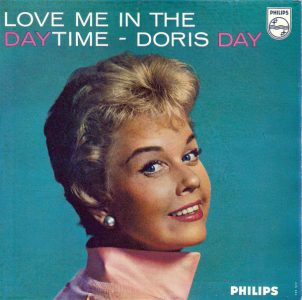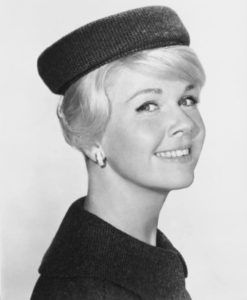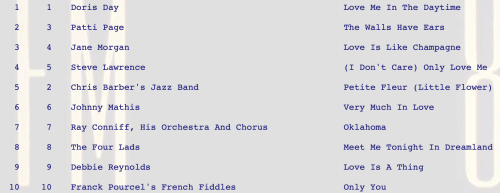#21: Love Me In The Daytime by Doris Day
City: Hull, PQ
Radio Station: CKCH
Peak Month: May 1959
Peak Position in Hull ~ #1
Peak position in Vancouver ~ #41
Peak Position on Billboard Hot 100 ~ #100
YouTube: “Love Me In The Daytime”
Lyrics: “Love Me In The Daytime”
Doris Mary Anne Kappelhoff was born in 1922 in Cincinnati, Ohio. For most of her life, Day stated that she was born in 1924, but on the occasion of her 95th birthday, the Associated Press found her birth certificate that showed a 1922 date of birth. She was part of a dance duo into the mid-30s, but an October 1937 car accident with a freight train resulted in her having a broken leg. As she recovered, she found herself singing along with variety songs on the radio. She took singing lessons. During the eight months when she was receiving singing lessons, Day secured her first professional jobs as a vocalist on the WLW-Cincinnati radio program Carlin’s Carnival and in a local restaurant, Charlie Yee’s Shanghai Inn. During her radio performances, she first caught the attention of Barney Rapp who was seeking a female vocalist and asked her to audition for the job. According to Rapp, he had auditioned about 200 other singers.
In 1939, Rapp suggested the stage name Doris Day because the Kappelhoff surname was too long for marquees and he admired her rendition of the song “Day After Day”. She appeared in three Sounds (3-minute film shorts featuring a singer) with Les Brown and his Orchestra in in the early 40s.
In 1944, she recorded with Les Brown “Sentimental Journey”. The song became a number-one hit with the song from May 26 to August 4, 1945. Sales exceeded 5 million! In 1998, the song was inducted into the Grammy Hall of Fame. In 1945 she had another number-one hit with “My Dreams Are Getting Better All the Time” from April 7 to May 19, 1945, which was also a million seller. Doris Day also had notable Top Ten hits with Les Brown and his Orchestra that included “Till The End Of Time” (#3, 1945), “You Won’t Be Satisfied (Until You Break My Heart)” (#2, 1946), “The Whole World Is Singing My Song” (#6, 1946), and “Sooner Or Later” (#8, 1947).
In 1948, Doris Day and Buddy Clark had a number-one hit with “Love Somebody”. The duo also had a Top ten hit with “My Darling, My Darling”. Later that year, “It’s Magic” was a #2 hit for Doris Day, and in 1949 “Again” matched her chart success of her previous solo effort. In 1948, Doris Day appeared in her first feature film, Romance on the High Seas. This was the film that featured “It’s Magic” and also received an Academy Award nomination for Best Original Song. She appeared at The 21st Annual Academy Awards in 1949, which was broadcast on television. The same year, Day released her first studio album on Columbia Records titled You’re My Thrill.
In the early 50s, Day racked up more Top Ten hits with “Bewitched, Bothered and Bewildered”, “Shanghai” and a duet with Frankie Laine titled “Sugar Bush”. In 1952, she had a number-one hit with “A Guy Is A Guy”.
In 1953, Doris Day teamed up with Johnnie Ray and charted to #4 in the UK with “Let’s Walk That-A-Way”. The following year, she released her biggest hit record, “Secret Love”, which topped the pop charts for five weeks in the spring of ’54. The song was from the film Calamity Jane, and won an Academy Award for best Original Song. In 1999, “Secret Love” was inducted into the Grammy Hall of Fame. Later in 1954, Doris Day’s “If I Give My Heart to You” peaked at #3. In 1956, Day had another big hit titled “Que Sera Sera (Whatever Will Be, Will Be)”. The song was featured in the 1956 film, The Man Who Knew Too Much. The song won an Academy Award for Best Original Song. In 2012, “Que Sera Sera…” was inducted into the Grammy Hall of Fame. Day earned a second Best Song nomination for “Julie” which was the theme song from the thriller film of the same name. The film grossed $11.3M (or $130M in 2024 US dollars).
Day had eight more releases to the end of 1958. But just one of these made the Top 40, “Everybody Loves A Lover”, which climbed to #6. She earned a Grammy Award nomination Best Vocal Performance Female for “Everybody loves a Lover”. Her single releases included theme songs to Teacher’s Pet and The Tunnel of Love. In 1958, Doris Day was the co-presenter at The 30th Annual Academy Awards. In 1959, Doris Day was nominated for Actress in a Leading Role at the Golden Globe Awards for The Tunnel of Love. In 1959, Day starred opposite Rock Hudson in Pillow Talk. The film earned $204M in 2024 dollars. Day was also nominated for an Academy Award in the Best Actress category. She lost out to Simone Signoret in Room at the Top. She was also nominated for a Best Actress award for the film at the Golden Globe Awards.
In the spring of 1959, Doris Day released “Love Me In The Daytime”, the debut release from her album Listen to Day.

“Love Me In The Daytime” was written by Bob Hilliard and Robert Allen. The song is about not only making love in the daytime, but the nighttime too: “Anytime you love me baby, that’ll be the right time.” In the song the singer looks forward to “red hot kisses,” dancing, and champagne, and “bearhugs” from the guy she is smitten with.
Bob Hilliard was born Hilliard Goldsmith, in 1918. After attending public school in New York City, he got work as a lyricist in Tin Pan Alley in the late 30’s. He has his first significant commercial success with “The Coffee Song” for Frank Sinatra in 1946. Hillard had another novelty hit that year with “Red Silk Stockings and Green Perfume” for Sammy Kaye. In 1947 Hillard co-wrote “Civilization (Bongo, Bongo, Bongo)” for the Broadway musical Angel in the Wings. On the pop charts, the Andrews Sisters and Danny Kaye took the song to #3. In 1948 Bob Hilliard penned a #1 country hit for Eddy Arnold titled “Bouquet Of Roses”. In 1949, “Careless Hands” by Mel Torme (as well as Sammy Kaye and Bing Crosby) spent 28 weeks on the Cashbox Disc-Hits chart, peaking at #6. Sammy Kaye’s version placed #26 for the year-end Billboard pop songs of 1949. That same year, Bob Hilliard also penned “Dear Hearts And Gentle People” for Dinah Shore, who had a #2 hit with the tune in early 1950. In 1950, Hilliard co-wrote “Dearie”, which peaked on the Billboard pop charts at #5 for Guy Lombardo. The following year Doris Day wondered “(Why Did I Tell You I Was Going To) Shanghai”, and took Bob Hilliard’s tune to #9.
In 1953, Bob Hilliard wrote several songs for the Broadway musical Hazel Flagg. In 1955 Hilliard composed “In The Wee Small Hours Of The Morning” for Frank Sinatra. In 1957, Hilliard co-wrote “Moonlight Gambler” for Frankie Laine, the #32 song for the year. In 1959, Bob Hilliard penned “Seven Little Girls (Sitting In the Back Seat)” for Paul Evans. And in 1960 Anita Bryant had a Top Ten hit with “My Little Corner Of The World”, written by Bob Hilliard and Lee Pockriss (composer of “Itsy Bitsy Teenie Weenie Yellow Polkadot Bikini”, “Johnny Angel”, Playground In My Mind” and other pop hits). That year, Bob Hilliard co-wrote his first song with Burt Bacharach titled “Please Stay”, a Top 20 hit for the Drifters. In 1961, Hilliard continued to adjust to the rock era co-writing with Burt Bacharach “Tower Of Strength” for Gene McDaniels. In 1962, Hilliard and Bacharach co-wrote the soul classic “Any Day Now”, a R&B hit for Chuck Jackson. That year Hilliard and Bacharach teamed up to write “Keep Away From Other Girls”, a Top Ten hit for Helen Shapiro in the UK and for Babs Tino in Vancouver (BC).
Bob Hilliard’s biggest hit was from writing the lyrics for “Our Day Will Come”, a #1 pop hit for Ruby & The Romantics in 1963. Bob Hilliard died from a heart attack at the age of 53 in 1971.
Robert Allen Deitcher was born in 1927 in Troy, New York, and raised in a Jewish family. He was an accompanist for Perry Como, vaudevillian Peter Lind Hays and Arthur Godfrey. His first hit record was in 1951 for Jo Stafford with her Top 20 hit “Kissin’ Bug Boogie”. In 1952, his song “To Know You (Is to Love You)” was a Top 20 hit for Perry Como. In 1953, Allen and Al Stillman began collaborating. They wrote “My One and Only Heart” was a #11 pop hit for Perry Como, and “You Alone (Solo Tu)” which reached #9 for Perry Como. In 1954, Como recorded the seasonal Allen-Stillman favorite, “(There’s No Place Like) Home for the Holidays”. It which eventually peaked at #8 on the Billboard Hot 100 in January 1955 on the Billboard Most Played by Jockeys chart.
In 1955, Allen and Stillman wrote “Moments To Remember” which was a #2 hit on the Billboard pop chart and #17 for the year. In 1956, they wrote “No Not Much” for the Four Lads peaked at #2 on the Billboard Disc Jockey chart. That year Robert Allen wrote “Song for a Summer Night” for Mitch Miller which reached #8 on the Billboard pop chart. While in 1957, Allen and Stillman had another hit for the Four Lads titled “Who Needs You?” which peaked at #9. They also had Top Ten hits that year for Johnny Mathis with “Chances Are” and “It’s Not For Me To Say”. In 1958, they wrote “There’s Only One Of You”. It reached #10 on the Billboard Pop chart. While a song recorded by Pat Boone titled “If Dreams Came True” climbed to #7 on the Billboard pop chart. In 1958, Allen cowrote “Everybody Loves A Lover”, a #6 hit in 1958 for Doris Day. Robert Allen died in 2000 at the age of 73.
“Love Me In The Daytime” peaked at #1 in Hull (QC) and Schenectady (NY), and #9 in Ottawa.

In 1960, Doris Day appeared in Midnight Lace, earning a Golden Globe nomination in the Best Actress category
Though she was shut out of the Top 40 in the USA and Canada in the 1960s, Doris Day had one more Top Ten international hit. In December 1963, the film Move Over Darling was released by 20th Century Fox. The comedy starred Doris Day and James Garner. The theme song, “Move Over Darling” was sung by Doris Day. It climbed to #1 in Hong Kong, #4 in New Zealand, and #8 in the UK. Day earned another Golden Globe nomination in the Actress in a Leading Role category. Between 1959 and 1964, Doris Day received five nominations in a Best Performance/Actress in a Leading Role category at the Golden Globes.
In 1963, Day appeared opposite James Garner in a comedy about a woman who gets hired to be on TV commercials promoting Happy Soap. The Thrill of It All earned $11,793,000.00 (or over $121M in 2024 US dollars). The previous year, That Touch of Mink, co-starring with Cary Grant, earned $17.6M (or $183M in 2024 US dollars). In 1964, Doris Day appeared opposite Rock Hudson and Tony Randall in Send Me No Flowers. The movie earned an equivalent of $92M in 2024 US dollars.
In 1989, Doris Day won a Cecil B. DeMille Award at the Golden Globes for “outstanding contributions to the world of entertainment.”
From 1968 to 1973, she was the host of 128 episodes of The Doris Day Show on CBS. The TV sitcom earned her a Golden Globe nomination in 1969. For the 1985-86 season, she came out of retirement and hosted the TV talk show Doris Day’s Best Friends. Rock Hudson, Doris Day’s frequent costar from a string of 1960s romantic comedies, was the guest star on the first episode of this show (taped in mid-July ’85). However, what was meant to be a heartwarming, nostalgic reunion was marred by the fact that Hudson, who had been diagnosed with HIV/AIDS the year before, was visibly ill and seriously struggling. It was one of his last public appearances before his death in October 1985.
Over the years, Doris Day appeared on numerous TV shows. She appeared twice as a mystery guest on What’s My Line? (1954 and 1957), The Bob Hope Show, The Ed Sullivan Show, The Merv Griffin Show, The Tonight Show Starring Johnny Carson, The Mike Douglas Show, and others.
Between 1949 and 1985, Doris Day released 32 studio albums. She starred in 39 feature films between 1948 and 1968. In 2004, she was awarded the Presidential Medal of Freedom by President George W. Bush.
On her 95th birthday it was discovered that the singer/actress had fibbed about being born in 1924. The Associated Press found her birth certificate from 1922. Doris Day died in May 2019, at the age of 97, or pneumonia. At her request, there was no funeral, public memorial, or grave marker.
Married four times, her son Terry Melcher (born Terry Day), was an executive producer for both The Doris Day Show and Doris Day’s Best Friends. He wrote the Top Ten surf hit “Hey Little Cobra” for the Rip Chords (1964). Melcher also wrote “Kokomo” for the Beach Boys, which became a number-one hit in 1988, and nominated for Best Song at the Golden Globes.
October 11, 2024
Ray McGinnis
References:
Benjamin Lee, “Doris Day, celebrated actor and singer, dies aged 97,” Guardian, May 13, 2019.
David Kaufman, Doris Day, The Untold Story of the Girl Next Door, (Virgin Books, 2020).
Michael Feinstein, with forward by Paul McCartney, Doris Day: Images of a Hollywood Icon, (Hermes Press, 2022).
Lynn Elber, “Birthday surprise for ageless Doris Day: She’s actually 95,” Associated Press, April 2, 2017.
“Broken Leg Perils Career of Cincinnati Dancer – Girl, 16, Is Injured on Eve of Trip to Hollywood,” Cincinnati Enquirer, October 15, 1937.
“Doris Day talks about Rock Hudson, Ronald Reagan, and her own story,” Pittsburgh Press, August 3, 1986.
“President Bush Presents the Presidential Medal of Freedom,” White House, June 23, 2004.
“Rock Hudson – Mystery Illness,” July 15, 1985.
“Producer Terry Melcher Dies at 62,” Billboard, November 22, 2004.
“Bob Hilliard“, Songwriters Hall of Fame, inducted 1983.
“Robert Allen, 73, Whose Songs Were Sung by an Array of Stars,” New York Times, October 5, 2000.

CKCH 970-AM Hull (QC) Top Ten | May 23, 1959

Leave a Reply